CAM201A: Analysis of the Nutritional Benefits of a Vegan Diet
VerifiedAdded on 2022/11/14
|8
|1664
|424
Report
AI Summary
This report provides a comprehensive analysis of the vegan diet, examining its nutritional composition, potential challenges, and therapeutic benefits. The report begins with an overview of the vegan diet, emphasizing the inclusion of fruits, vegetables, grains, and nuts. It details the nutritional components, including proteins, carbohydrates, vitamins, and minerals. The report also addresses potential challenges, such as deficiencies in vitamin B12 and omega-3 fatty acids, and offers strategies to overcome these issues. Finally, the report highlights the therapeutic benefits of the vegan diet, such as weight management, heart health, blood glucose control, and potential benefits in kidney function and cancer prevention. The report concludes that, while the vegan diet offers numerous health advantages, careful planning and supplementation may be necessary to ensure optimal nutritional intake.
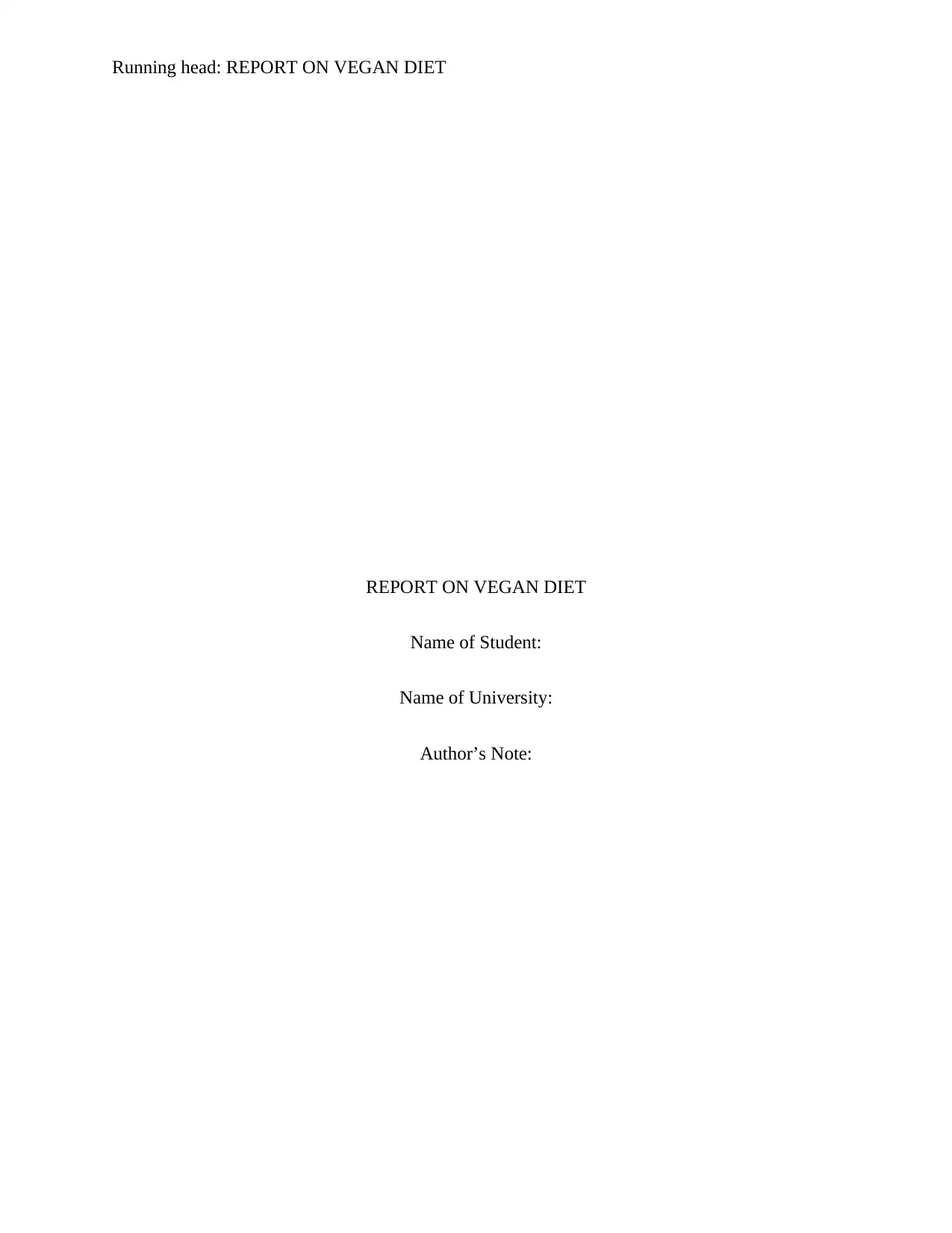
Running head: REPORT ON VEGAN DIET
REPORT ON VEGAN DIET
Name of Student:
Name of University:
Author’s Note:
REPORT ON VEGAN DIET
Name of Student:
Name of University:
Author’s Note:
Paraphrase This Document
Need a fresh take? Get an instant paraphrase of this document with our AI Paraphraser
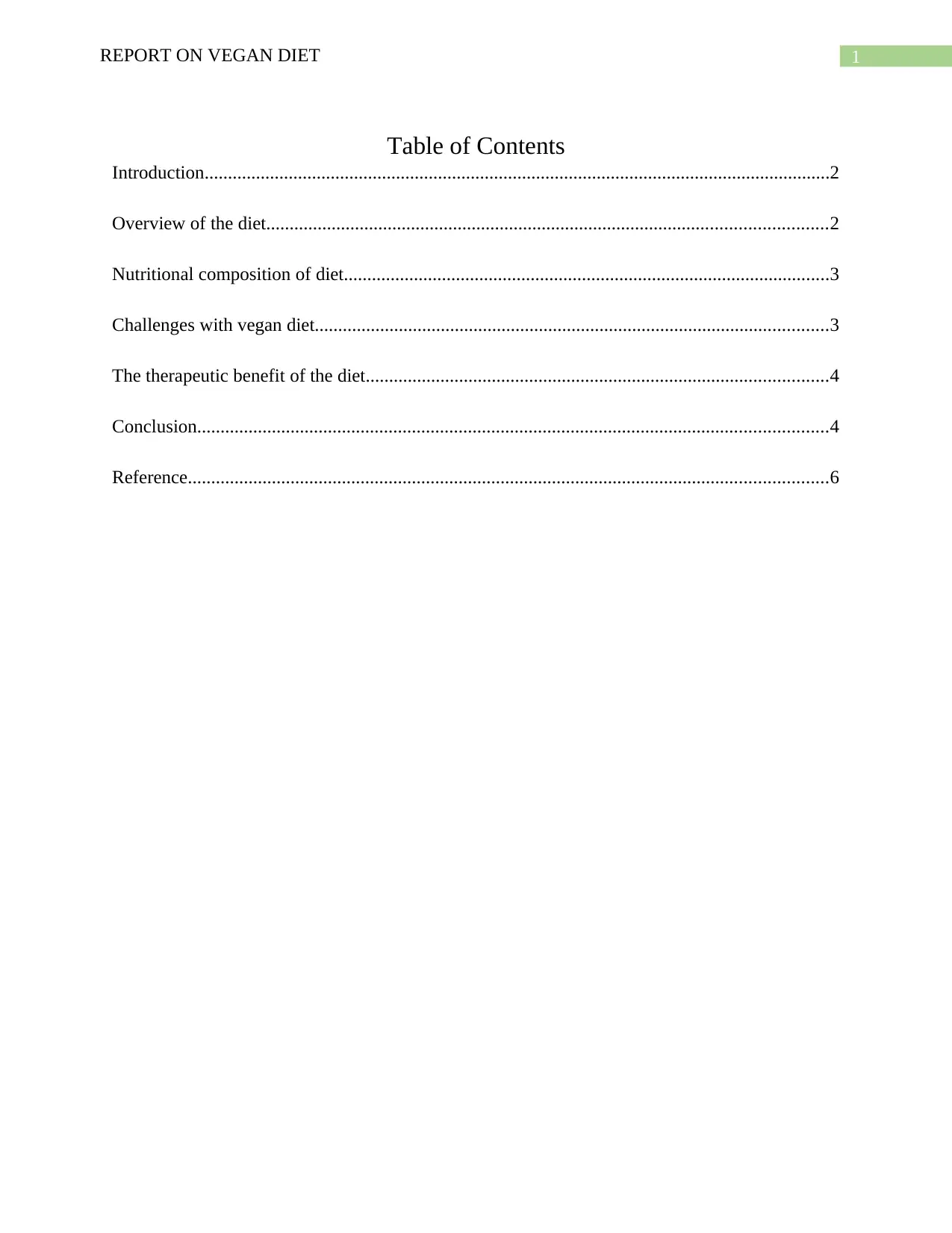
1REPORT ON VEGAN DIET
Table of Contents
Introduction......................................................................................................................................2
Overview of the diet........................................................................................................................2
Nutritional composition of diet........................................................................................................3
Challenges with vegan diet..............................................................................................................3
The therapeutic benefit of the diet...................................................................................................4
Conclusion.......................................................................................................................................4
Reference.........................................................................................................................................6
Table of Contents
Introduction......................................................................................................................................2
Overview of the diet........................................................................................................................2
Nutritional composition of diet........................................................................................................3
Challenges with vegan diet..............................................................................................................3
The therapeutic benefit of the diet...................................................................................................4
Conclusion.......................................................................................................................................4
Reference.........................................................................................................................................6
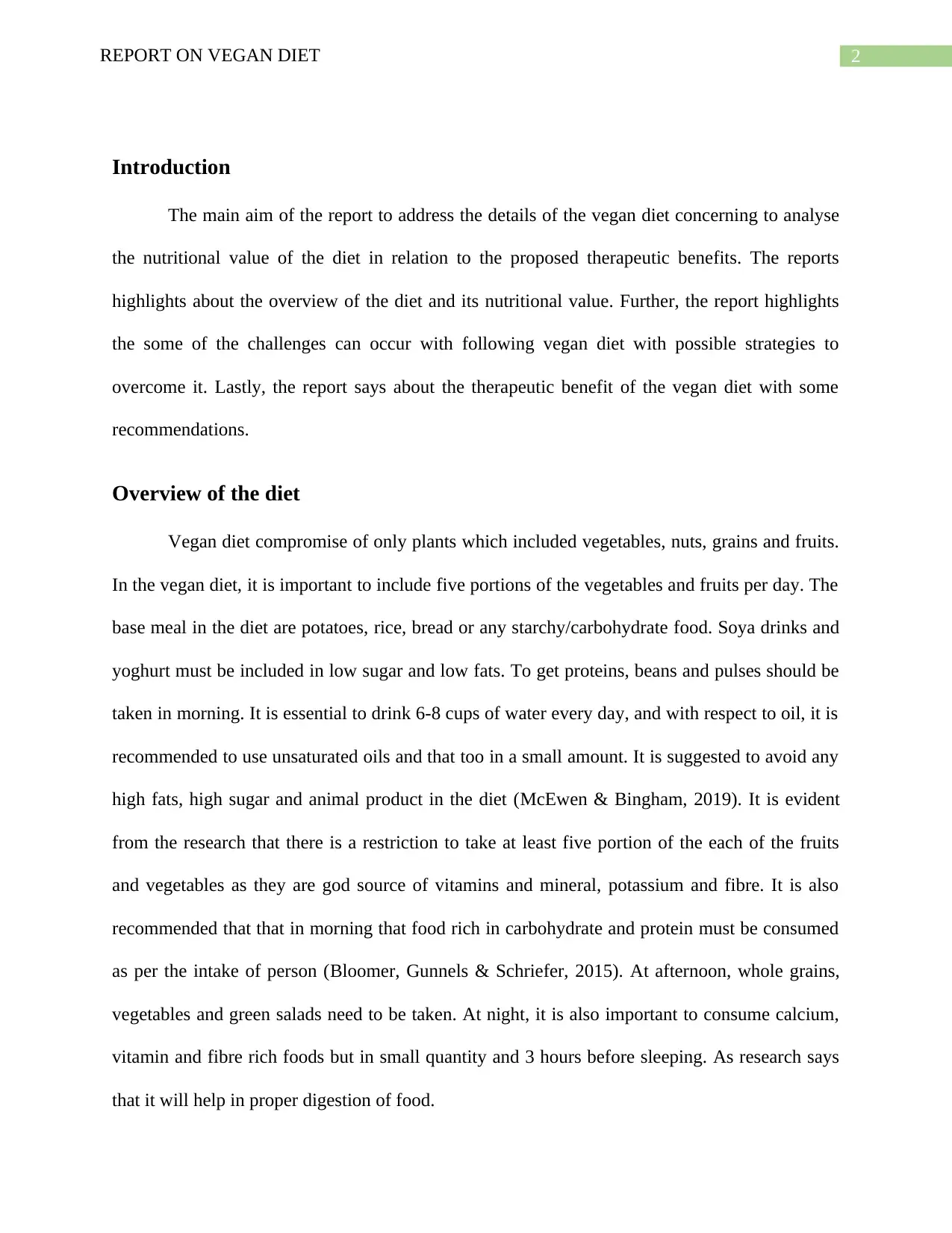
2REPORT ON VEGAN DIET
Introduction
The main aim of the report to address the details of the vegan diet concerning to analyse
the nutritional value of the diet in relation to the proposed therapeutic benefits. The reports
highlights about the overview of the diet and its nutritional value. Further, the report highlights
the some of the challenges can occur with following vegan diet with possible strategies to
overcome it. Lastly, the report says about the therapeutic benefit of the vegan diet with some
recommendations.
Overview of the diet
Vegan diet compromise of only plants which included vegetables, nuts, grains and fruits.
In the vegan diet, it is important to include five portions of the vegetables and fruits per day. The
base meal in the diet are potatoes, rice, bread or any starchy/carbohydrate food. Soya drinks and
yoghurt must be included in low sugar and low fats. To get proteins, beans and pulses should be
taken in morning. It is essential to drink 6-8 cups of water every day, and with respect to oil, it is
recommended to use unsaturated oils and that too in a small amount. It is suggested to avoid any
high fats, high sugar and animal product in the diet (McEwen & Bingham, 2019). It is evident
from the research that there is a restriction to take at least five portion of the each of the fruits
and vegetables as they are god source of vitamins and mineral, potassium and fibre. It is also
recommended that that in morning that food rich in carbohydrate and protein must be consumed
as per the intake of person (Bloomer, Gunnels & Schriefer, 2015). At afternoon, whole grains,
vegetables and green salads need to be taken. At night, it is also important to consume calcium,
vitamin and fibre rich foods but in small quantity and 3 hours before sleeping. As research says
that it will help in proper digestion of food.
Introduction
The main aim of the report to address the details of the vegan diet concerning to analyse
the nutritional value of the diet in relation to the proposed therapeutic benefits. The reports
highlights about the overview of the diet and its nutritional value. Further, the report highlights
the some of the challenges can occur with following vegan diet with possible strategies to
overcome it. Lastly, the report says about the therapeutic benefit of the vegan diet with some
recommendations.
Overview of the diet
Vegan diet compromise of only plants which included vegetables, nuts, grains and fruits.
In the vegan diet, it is important to include five portions of the vegetables and fruits per day. The
base meal in the diet are potatoes, rice, bread or any starchy/carbohydrate food. Soya drinks and
yoghurt must be included in low sugar and low fats. To get proteins, beans and pulses should be
taken in morning. It is essential to drink 6-8 cups of water every day, and with respect to oil, it is
recommended to use unsaturated oils and that too in a small amount. It is suggested to avoid any
high fats, high sugar and animal product in the diet (McEwen & Bingham, 2019). It is evident
from the research that there is a restriction to take at least five portion of the each of the fruits
and vegetables as they are god source of vitamins and mineral, potassium and fibre. It is also
recommended that that in morning that food rich in carbohydrate and protein must be consumed
as per the intake of person (Bloomer, Gunnels & Schriefer, 2015). At afternoon, whole grains,
vegetables and green salads need to be taken. At night, it is also important to consume calcium,
vitamin and fibre rich foods but in small quantity and 3 hours before sleeping. As research says
that it will help in proper digestion of food.
⊘ This is a preview!⊘
Do you want full access?
Subscribe today to unlock all pages.

Trusted by 1+ million students worldwide
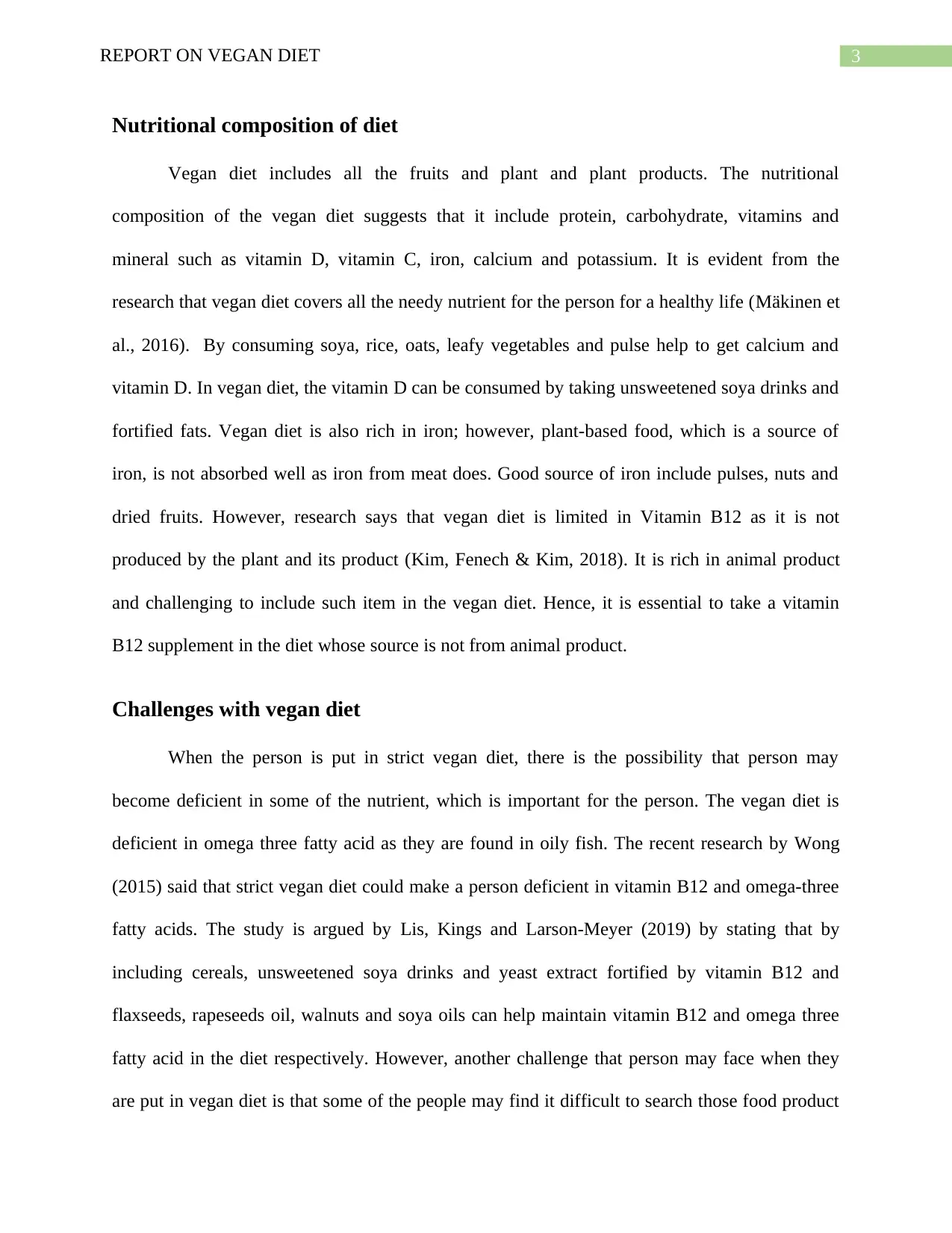
3REPORT ON VEGAN DIET
Nutritional composition of diet
Vegan diet includes all the fruits and plant and plant products. The nutritional
composition of the vegan diet suggests that it include protein, carbohydrate, vitamins and
mineral such as vitamin D, vitamin C, iron, calcium and potassium. It is evident from the
research that vegan diet covers all the needy nutrient for the person for a healthy life (Mäkinen et
al., 2016). By consuming soya, rice, oats, leafy vegetables and pulse help to get calcium and
vitamin D. In vegan diet, the vitamin D can be consumed by taking unsweetened soya drinks and
fortified fats. Vegan diet is also rich in iron; however, plant-based food, which is a source of
iron, is not absorbed well as iron from meat does. Good source of iron include pulses, nuts and
dried fruits. However, research says that vegan diet is limited in Vitamin B12 as it is not
produced by the plant and its product (Kim, Fenech & Kim, 2018). It is rich in animal product
and challenging to include such item in the vegan diet. Hence, it is essential to take a vitamin
B12 supplement in the diet whose source is not from animal product.
Challenges with vegan diet
When the person is put in strict vegan diet, there is the possibility that person may
become deficient in some of the nutrient, which is important for the person. The vegan diet is
deficient in omega three fatty acid as they are found in oily fish. The recent research by Wong
(2015) said that strict vegan diet could make a person deficient in vitamin B12 and omega-three
fatty acids. The study is argued by Lis, Kings and Larson-Meyer (2019) by stating that by
including cereals, unsweetened soya drinks and yeast extract fortified by vitamin B12 and
flaxseeds, rapeseeds oil, walnuts and soya oils can help maintain vitamin B12 and omega three
fatty acid in the diet respectively. However, another challenge that person may face when they
are put in vegan diet is that some of the people may find it difficult to search those food product
Nutritional composition of diet
Vegan diet includes all the fruits and plant and plant products. The nutritional
composition of the vegan diet suggests that it include protein, carbohydrate, vitamins and
mineral such as vitamin D, vitamin C, iron, calcium and potassium. It is evident from the
research that vegan diet covers all the needy nutrient for the person for a healthy life (Mäkinen et
al., 2016). By consuming soya, rice, oats, leafy vegetables and pulse help to get calcium and
vitamin D. In vegan diet, the vitamin D can be consumed by taking unsweetened soya drinks and
fortified fats. Vegan diet is also rich in iron; however, plant-based food, which is a source of
iron, is not absorbed well as iron from meat does. Good source of iron include pulses, nuts and
dried fruits. However, research says that vegan diet is limited in Vitamin B12 as it is not
produced by the plant and its product (Kim, Fenech & Kim, 2018). It is rich in animal product
and challenging to include such item in the vegan diet. Hence, it is essential to take a vitamin
B12 supplement in the diet whose source is not from animal product.
Challenges with vegan diet
When the person is put in strict vegan diet, there is the possibility that person may
become deficient in some of the nutrient, which is important for the person. The vegan diet is
deficient in omega three fatty acid as they are found in oily fish. The recent research by Wong
(2015) said that strict vegan diet could make a person deficient in vitamin B12 and omega-three
fatty acids. The study is argued by Lis, Kings and Larson-Meyer (2019) by stating that by
including cereals, unsweetened soya drinks and yeast extract fortified by vitamin B12 and
flaxseeds, rapeseeds oil, walnuts and soya oils can help maintain vitamin B12 and omega three
fatty acid in the diet respectively. However, another challenge that person may face when they
are put in vegan diet is that some of the people may find it difficult to search those food product
Paraphrase This Document
Need a fresh take? Get an instant paraphrase of this document with our AI Paraphraser
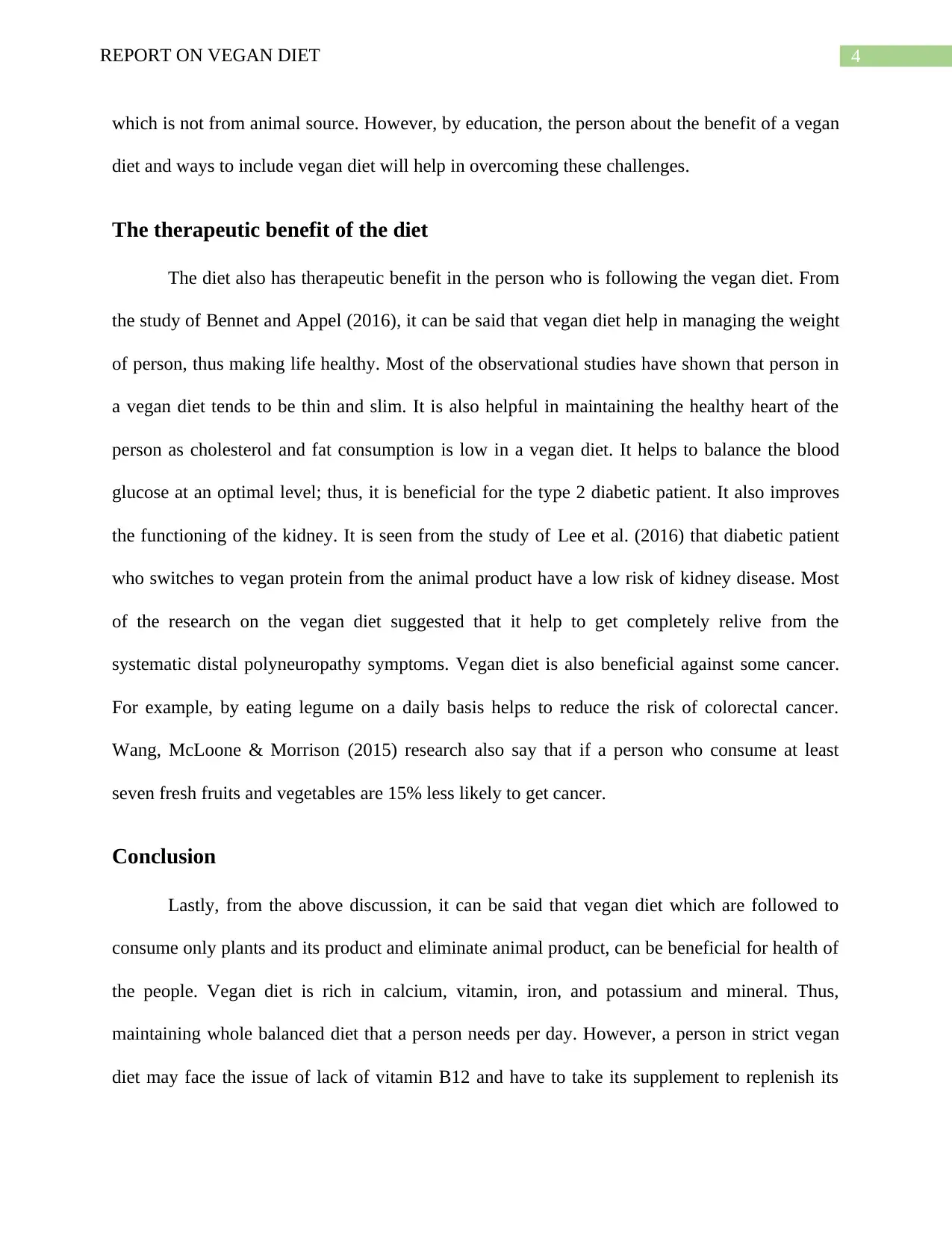
4REPORT ON VEGAN DIET
which is not from animal source. However, by education, the person about the benefit of a vegan
diet and ways to include vegan diet will help in overcoming these challenges.
The therapeutic benefit of the diet
The diet also has therapeutic benefit in the person who is following the vegan diet. From
the study of Bennet and Appel (2016), it can be said that vegan diet help in managing the weight
of person, thus making life healthy. Most of the observational studies have shown that person in
a vegan diet tends to be thin and slim. It is also helpful in maintaining the healthy heart of the
person as cholesterol and fat consumption is low in a vegan diet. It helps to balance the blood
glucose at an optimal level; thus, it is beneficial for the type 2 diabetic patient. It also improves
the functioning of the kidney. It is seen from the study of Lee et al. (2016) that diabetic patient
who switches to vegan protein from the animal product have a low risk of kidney disease. Most
of the research on the vegan diet suggested that it help to get completely relive from the
systematic distal polyneuropathy symptoms. Vegan diet is also beneficial against some cancer.
For example, by eating legume on a daily basis helps to reduce the risk of colorectal cancer.
Wang, McLoone & Morrison (2015) research also say that if a person who consume at least
seven fresh fruits and vegetables are 15% less likely to get cancer.
Conclusion
Lastly, from the above discussion, it can be said that vegan diet which are followed to
consume only plants and its product and eliminate animal product, can be beneficial for health of
the people. Vegan diet is rich in calcium, vitamin, iron, and potassium and mineral. Thus,
maintaining whole balanced diet that a person needs per day. However, a person in strict vegan
diet may face the issue of lack of vitamin B12 and have to take its supplement to replenish its
which is not from animal source. However, by education, the person about the benefit of a vegan
diet and ways to include vegan diet will help in overcoming these challenges.
The therapeutic benefit of the diet
The diet also has therapeutic benefit in the person who is following the vegan diet. From
the study of Bennet and Appel (2016), it can be said that vegan diet help in managing the weight
of person, thus making life healthy. Most of the observational studies have shown that person in
a vegan diet tends to be thin and slim. It is also helpful in maintaining the healthy heart of the
person as cholesterol and fat consumption is low in a vegan diet. It helps to balance the blood
glucose at an optimal level; thus, it is beneficial for the type 2 diabetic patient. It also improves
the functioning of the kidney. It is seen from the study of Lee et al. (2016) that diabetic patient
who switches to vegan protein from the animal product have a low risk of kidney disease. Most
of the research on the vegan diet suggested that it help to get completely relive from the
systematic distal polyneuropathy symptoms. Vegan diet is also beneficial against some cancer.
For example, by eating legume on a daily basis helps to reduce the risk of colorectal cancer.
Wang, McLoone & Morrison (2015) research also say that if a person who consume at least
seven fresh fruits and vegetables are 15% less likely to get cancer.
Conclusion
Lastly, from the above discussion, it can be said that vegan diet which are followed to
consume only plants and its product and eliminate animal product, can be beneficial for health of
the people. Vegan diet is rich in calcium, vitamin, iron, and potassium and mineral. Thus,
maintaining whole balanced diet that a person needs per day. However, a person in strict vegan
diet may face the issue of lack of vitamin B12 and have to take its supplement to replenish its
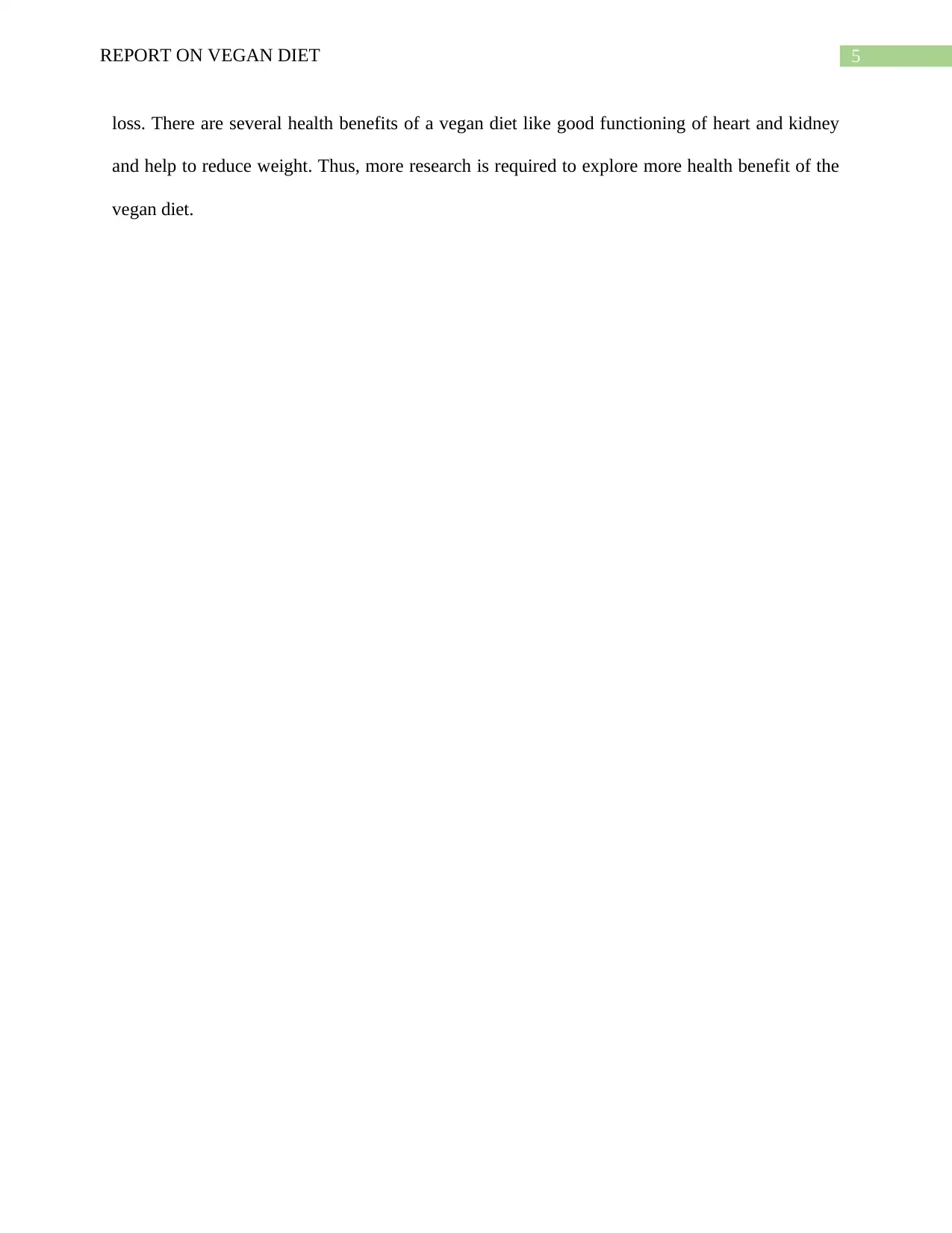
5REPORT ON VEGAN DIET
loss. There are several health benefits of a vegan diet like good functioning of heart and kidney
and help to reduce weight. Thus, more research is required to explore more health benefit of the
vegan diet.
loss. There are several health benefits of a vegan diet like good functioning of heart and kidney
and help to reduce weight. Thus, more research is required to explore more health benefit of the
vegan diet.
⊘ This is a preview!⊘
Do you want full access?
Subscribe today to unlock all pages.

Trusted by 1+ million students worldwide
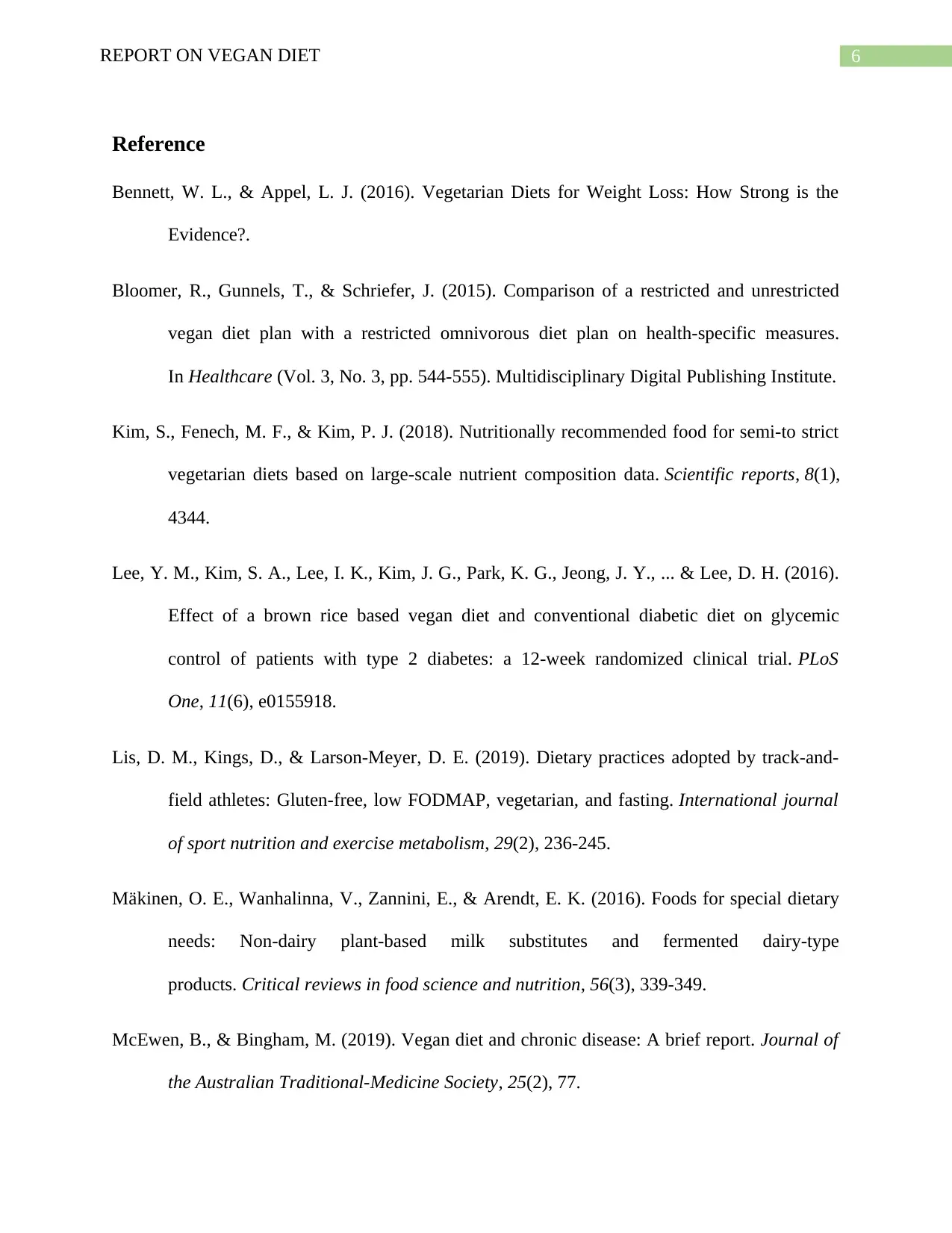
6REPORT ON VEGAN DIET
Reference
Bennett, W. L., & Appel, L. J. (2016). Vegetarian Diets for Weight Loss: How Strong is the
Evidence?.
Bloomer, R., Gunnels, T., & Schriefer, J. (2015). Comparison of a restricted and unrestricted
vegan diet plan with a restricted omnivorous diet plan on health-specific measures.
In Healthcare (Vol. 3, No. 3, pp. 544-555). Multidisciplinary Digital Publishing Institute.
Kim, S., Fenech, M. F., & Kim, P. J. (2018). Nutritionally recommended food for semi-to strict
vegetarian diets based on large-scale nutrient composition data. Scientific reports, 8(1),
4344.
Lee, Y. M., Kim, S. A., Lee, I. K., Kim, J. G., Park, K. G., Jeong, J. Y., ... & Lee, D. H. (2016).
Effect of a brown rice based vegan diet and conventional diabetic diet on glycemic
control of patients with type 2 diabetes: a 12-week randomized clinical trial. PLoS
One, 11(6), e0155918.
Lis, D. M., Kings, D., & Larson-Meyer, D. E. (2019). Dietary practices adopted by track-and-
field athletes: Gluten-free, low FODMAP, vegetarian, and fasting. International journal
of sport nutrition and exercise metabolism, 29(2), 236-245.
Mäkinen, O. E., Wanhalinna, V., Zannini, E., & Arendt, E. K. (2016). Foods for special dietary
needs: Non-dairy plant-based milk substitutes and fermented dairy-type
products. Critical reviews in food science and nutrition, 56(3), 339-349.
McEwen, B., & Bingham, M. (2019). Vegan diet and chronic disease: A brief report. Journal of
the Australian Traditional-Medicine Society, 25(2), 77.
Reference
Bennett, W. L., & Appel, L. J. (2016). Vegetarian Diets for Weight Loss: How Strong is the
Evidence?.
Bloomer, R., Gunnels, T., & Schriefer, J. (2015). Comparison of a restricted and unrestricted
vegan diet plan with a restricted omnivorous diet plan on health-specific measures.
In Healthcare (Vol. 3, No. 3, pp. 544-555). Multidisciplinary Digital Publishing Institute.
Kim, S., Fenech, M. F., & Kim, P. J. (2018). Nutritionally recommended food for semi-to strict
vegetarian diets based on large-scale nutrient composition data. Scientific reports, 8(1),
4344.
Lee, Y. M., Kim, S. A., Lee, I. K., Kim, J. G., Park, K. G., Jeong, J. Y., ... & Lee, D. H. (2016).
Effect of a brown rice based vegan diet and conventional diabetic diet on glycemic
control of patients with type 2 diabetes: a 12-week randomized clinical trial. PLoS
One, 11(6), e0155918.
Lis, D. M., Kings, D., & Larson-Meyer, D. E. (2019). Dietary practices adopted by track-and-
field athletes: Gluten-free, low FODMAP, vegetarian, and fasting. International journal
of sport nutrition and exercise metabolism, 29(2), 236-245.
Mäkinen, O. E., Wanhalinna, V., Zannini, E., & Arendt, E. K. (2016). Foods for special dietary
needs: Non-dairy plant-based milk substitutes and fermented dairy-type
products. Critical reviews in food science and nutrition, 56(3), 339-349.
McEwen, B., & Bingham, M. (2019). Vegan diet and chronic disease: A brief report. Journal of
the Australian Traditional-Medicine Society, 25(2), 77.
Paraphrase This Document
Need a fresh take? Get an instant paraphrase of this document with our AI Paraphraser
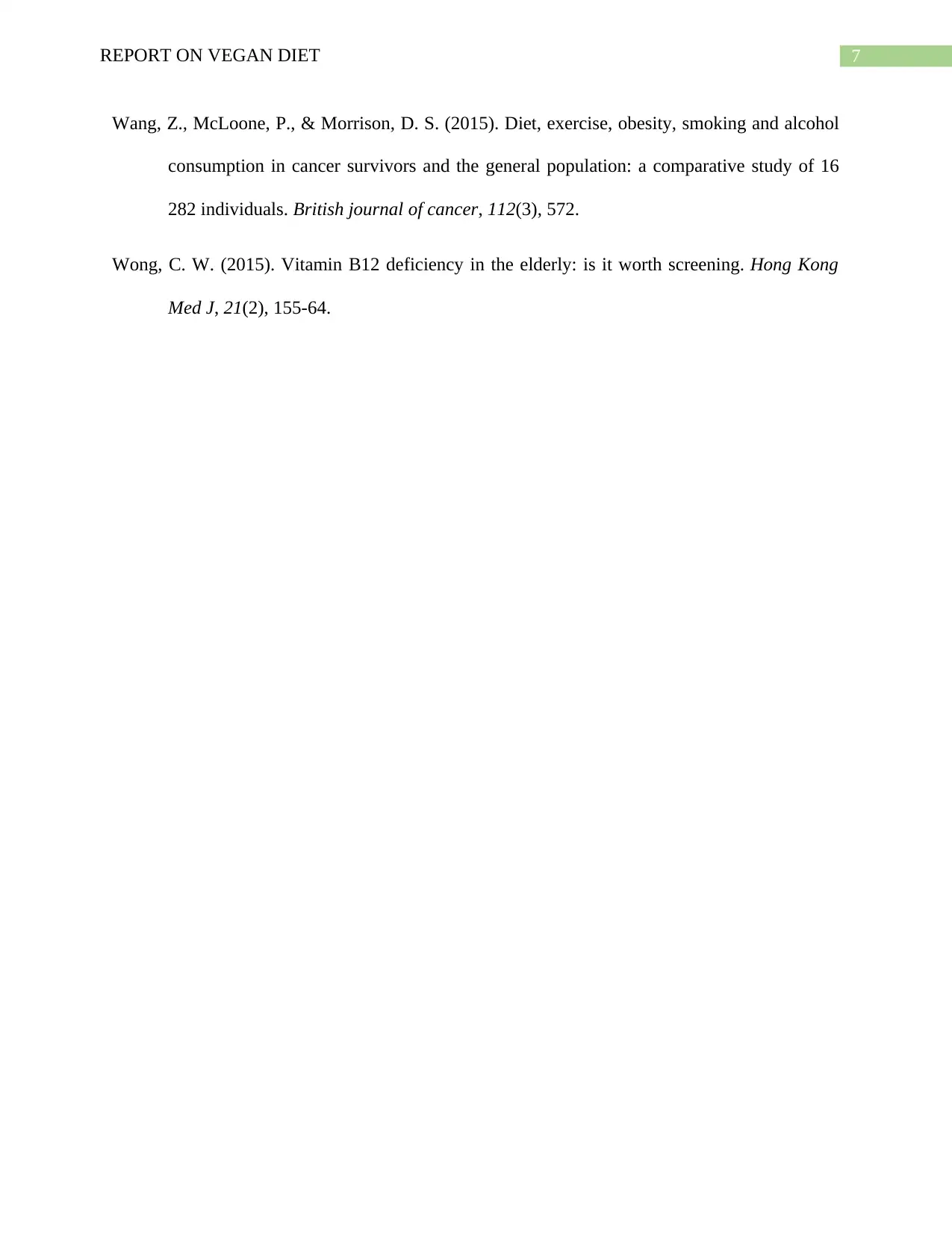
7REPORT ON VEGAN DIET
Wang, Z., McLoone, P., & Morrison, D. S. (2015). Diet, exercise, obesity, smoking and alcohol
consumption in cancer survivors and the general population: a comparative study of 16
282 individuals. British journal of cancer, 112(3), 572.
Wong, C. W. (2015). Vitamin B12 deficiency in the elderly: is it worth screening. Hong Kong
Med J, 21(2), 155-64.
Wang, Z., McLoone, P., & Morrison, D. S. (2015). Diet, exercise, obesity, smoking and alcohol
consumption in cancer survivors and the general population: a comparative study of 16
282 individuals. British journal of cancer, 112(3), 572.
Wong, C. W. (2015). Vitamin B12 deficiency in the elderly: is it worth screening. Hong Kong
Med J, 21(2), 155-64.
1 out of 8
Related Documents
Your All-in-One AI-Powered Toolkit for Academic Success.
+13062052269
info@desklib.com
Available 24*7 on WhatsApp / Email
![[object Object]](/_next/static/media/star-bottom.7253800d.svg)
Unlock your academic potential
Copyright © 2020–2026 A2Z Services. All Rights Reserved. Developed and managed by ZUCOL.





